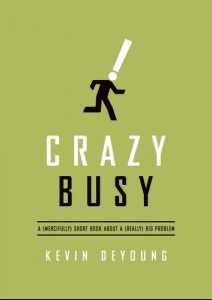 Review of ‘Crazy Busy – a (mercifully) short book about a (really) big problem.
Review of ‘Crazy Busy – a (mercifully) short book about a (really) big problem.
by Kevin DeYoung
Published by Crossway
“How’s your week been?” I ask a friend at church. It’s a banal question, so I expect a similarly bland response. But an experiment over several weeks sees ‘busy’ appear at least 70 per cent of the time, in some form. It comes, usually, right up front. Or the look on their faces (often accompanied by a heaving sigh or crazy-eyes) makes the word redundant.
“Most everyone I know feels frazzled and overwhelmed most of the time,” writes Kevin DeYoung in his latest book Crazy Busy. Described as a “(mercifully) short book about a (really) big problem,” DeYoung has hit on a topic I’ve been struggling with for the good part of a year.
Since my experiment, I’ve tried in earnest not to use the word ‘busy’ in my greetings vocabulary. It’s hard; a habit difficult to break. But also, there’s a lingering fear that if I don’t say I’m busy, people might not know that I am, or think they’re busier than I am, which somehow makes me feel… inadequate.
It’s why DeYoung’s book has struck a nerve. He doesn’t lay out the definitive guide to overcome busyness, or suggest you should only work four hours a week, or give you a list of schedulers to plan out your life. Instead, he suggests a realistic vision for a less frantic, Christian life.
In world dominated by FOMO (fear of missing out), it’s no wonder we feel so frantic. It’s the curse of the affluent, according to DeYoung. “Because we can do so much, we do do so much. Our lives have no limits.”
But the majority of it is self-inflicted. “The disorder of daily life is a product of a disorder in the innermost places of our heart.”
DeYoung isn’t the first to recognise this busyness epidemic. The New York Times calls it ‘the busy trap’ and suggests “busyness serves as a kind of existential reassurance, a hedge against emptiness.” The Harvard Business Review puts the word ‘busy’ down to just another “humble brag” and begs, “stop complaining about how busy you are”.
But what DeYoung brings to this discussion is the revelation that Christians were “made to be busy”. But it’s the type of busyness that matters.
In a series of helpful vignettes, Crazy Busy sets out a series of diagnoses—how you can tell that your ‘busy’ is not the good type. He deals with ‘mission creep’ and not setting priorities (and sticking to them), the problem of pride, thinking that looking like you can do it all somehow makes you better in the eyes of others, and why we need to stop freaking out about our kids.
But the one that rang in my ears was Diagnosis #5: You are letting the screen strangle your soul. If you’ve never heard of ‘acedia’, it’s about time you did. DeYoung describes it as “purposelessness disguised as constant commotion”. He challenges the reader to think carefully about how much of their ‘busyness’ is really constant distraction by digital means; the “endless noise” of the internet and social media. The greatest danger of the digital age, he argues, is a lack of depth and an inability (or worse, a disinterest in) being still or “off the grid”.
“The biggest deception of our digital age may be the lie that says we can be omni-competent, omni-informed, and omni-present. We cannot be any of these things. We must choose our absence, our inability, and our ignorance—and choose wisely.”
This book is only 118 pages. If you still think you’re too busy to read it, then you need to read this book, fast, and work out why.
Email This Story
Why not send this to a friend?
